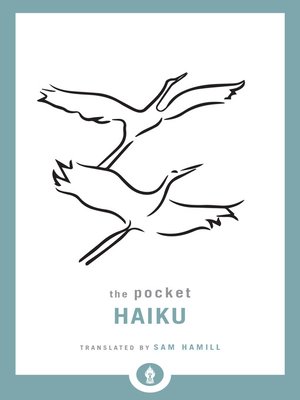
Sign up to save your library
With an OverDrive account, you can save your favorite libraries for at-a-glance information about availability. Find out more about OverDrive accounts.
Find this title in Libby, the library reading app by OverDrive.



Search for a digital library with this title
Title found at these libraries:
| Library Name | Distance |
|---|---|
| Loading... |
Quintessential classical Japanese haiku—selected and translated by one of America's premier poet-translators—now available in a pocket edition.
In this collection of haiku, translator Sam Hamill has compiled the best from the tradition, spanning the sixteenth through nineteenth centuries, with particular focus on the three great masters: Bashō, Buson, and Issa. Based on images from nature, the poems address the themes of joy, temporality, beauty, wonder, loneliness, and loss.
Haiku may be the most popular and widely recognizable poetic form in the world. In just three lines a great haiku presents a crystalline moment of image, emotion, and awareness. Elements of compassion, silence, and a sense of temporality often combine to reveal a quality of mystery. Just as often, haiku may bring a startling insight into the ordinary, or a flash of humor. Collected here are over two hundred of the best haiku of Japanese literature—written by the great masters of the genre.
The featured poets are Bashō, Buson, Issa, Moritake, Sōin, Sanpū, Kikaku, Ransetsu, Kyorai, Raizan, Kakei, Onitsura, Taigi, Chiyo, Sogetsuni, Sogi, Fuhaku, Teiga, Kikusha-ni, Tayo-jo, Sōchō, Shōha, and Shiki.
This is a pocket-size reissue of The Sound of Water (Shambhala, 1995).
In this collection of haiku, translator Sam Hamill has compiled the best from the tradition, spanning the sixteenth through nineteenth centuries, with particular focus on the three great masters: Bashō, Buson, and Issa. Based on images from nature, the poems address the themes of joy, temporality, beauty, wonder, loneliness, and loss.
Haiku may be the most popular and widely recognizable poetic form in the world. In just three lines a great haiku presents a crystalline moment of image, emotion, and awareness. Elements of compassion, silence, and a sense of temporality often combine to reveal a quality of mystery. Just as often, haiku may bring a startling insight into the ordinary, or a flash of humor. Collected here are over two hundred of the best haiku of Japanese literature—written by the great masters of the genre.
The featured poets are Bashō, Buson, Issa, Moritake, Sōin, Sanpū, Kikaku, Ransetsu, Kyorai, Raizan, Kakei, Onitsura, Taigi, Chiyo, Sogetsuni, Sogi, Fuhaku, Teiga, Kikusha-ni, Tayo-jo, Sōchō, Shōha, and Shiki.
This is a pocket-size reissue of The Sound of Water (Shambhala, 1995).







